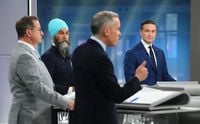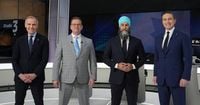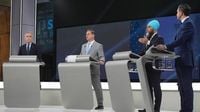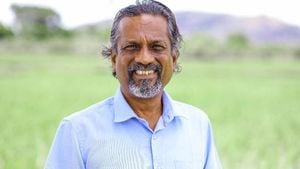As the countdown to Canada’s federal election intensifies, the country’s top political leaders are set to face off in a critical English-language debate tonight, April 17, 2025, at 7:00 p.m. ET. Liberal Leader Mark Carney, Conservative Leader Pierre Poilievre, NDP Leader Jagmeet Singh, and Bloc Québécois Leader Yves-François Blanchet will engage in a lively discussion aimed at swaying undecided voters just eleven days before the polls open on April 28.
This debate follows a heated French-language confrontation held the previous night, where the leaders sparred over pressing issues such as pipelines, the economy, and the ramifications of U.S. President Donald Trump’s trade policies. Carney, who has been leading in the polls, emerged as a primary target for his opponents during the French debate, with Poilievre accusing him of aligning too closely with the policies of former Prime Minister Justin Trudeau.
According to a recent Ipsos poll, while Carney continues to maintain a lead, the Conservatives have narrowed the gap, indicating a potentially tight race. The survey also revealed that approximately four in ten Canadians plan to watch the debates this week, with Carney favored to perform well in the English debate, while Poilievre is expected to shine in the French debate.
The English-language debate will be moderated by Steve Paikin, a seasoned journalist known for his role on TVO’s flagship current affairs program, The Agenda. He aims to create an environment conducive to open dialogue, focusing on five major themes: affordability and the cost of living, energy and climate, leading in a crisis, public safety and security, and tariffs and threats to Canada.
Political analysts suggest that the pressure is on Poilievre to deliver a strong performance tonight. Jonathan Kalles, a consultant at McMillan Vantage and a former adviser to Justin Trudeau, stated, “The pressure is squarely on Pierre Poilievre because if he doesn’t have a knockout punch in the English debate, I don’t know what he’s left with.”
During the French debate, Carney defended his record, stating he had only been in office for a month and had already reached agreements with Canada’s premiers to work on a national energy corridor and removing trade barriers. He emphasized that his administration aims to address the concerns of everyday Canadians, particularly regarding the rising cost of living.
Singh, who is fighting to secure his party's future in the upcoming election, has indicated that he will focus on reminding voters of the NDP’s commitment to public healthcare and its initiatives like dental care and pharmacare. With the NDP currently polling at 8.5 percent nationally, Singh is keen to secure more seats in Parliament, as a minimum of twelve is necessary for official party status.
In contrast, Blanchet has been vocal about defending Quebec’s interests, criticizing Carney’s ability to negotiate effectively with the U.S. on behalf of the province. As the election approaches, he is adamant that Quebecers must choose a leader who will stand up for their rights.
The debate is set to be broadcast live from the atrium of Maison de Radio-Canada in Montreal. Canadians can watch the event across various platforms, including the Yahoo Canada Homepage, CBC News, CTV News, and Global News. The debate is expected to last for 120 minutes without commercial interruptions, allowing ample time for in-depth discussions on the critical issues facing the nation.
In light of the recent controversies surrounding the Leaders' Debate Commission, which faced backlash for excluding the Green Party’s Jonathan Pedneault from the debates, there are heightened expectations for a fair and balanced representation in tonight's event. The commission has implemented new rules to ensure that media questions are limited to one per outlet and that follow-up questions are not permitted, aiming to streamline the post-debate discussions.
As the leaders prepare for a night of intense scrutiny and debate, the stakes could not be higher. With early voting set to begin tomorrow, April 18, 2025, the outcome of tonight’s debate may very well influence the final voter turnout and decision-making process for Canadians.
In a previous interview, University of Toronto professor Phil Triadafilopoulos highlighted the unique nature of this election cycle, stating, "Simple: Donald Trump" when discussing how U.S. policies are shaping Canadian political discourse. His assertion underscores the influence of external factors on domestic elections, particularly as Canadian parties navigate their responses to Trump’s actions.
As the leaders take to the stage tonight, viewers will be keenly watching to see how each candidate articulates their vision for Canada and addresses the pressing issues that matter most to voters. With the election just around the corner, every word spoken could resonate with millions of Canadians looking for direction and leadership in uncertain times.






